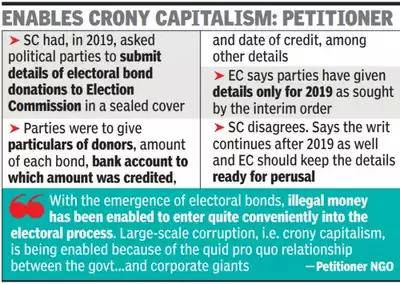Ahmedabad
(Head Office)Address : 506, 3rd EYE THREE (III), Opp. Induben Khakhrawala, Girish Cold Drink Cross Road, CG Road, Navrangpura, Ahmedabad, 380009.
Mobile : 8469231587 / 9586028957
Telephone : 079-40098991
E-mail: dics.upsc@gmail.com

Electoral Bonds Scheme, 2018
News: A five-judge Constitution Bench of the Supreme Court headed by Chief Justice of India (CJI) D Y Chandrachud will begin hearing a batch of petitions challenging the Finance Ministry’s Electoral Bonds Scheme, 2018.
What are Electoral Bonds?
• “Electoral bonds” are interest-free “bearer instruments”, which means that they are payable to the bearer on demand, similar to a promissory note.
Who is eligible to buy these bonds?
• Any citizen of India or entities incorporated or established in India can purchase these Bonds.
Which political parties are eligible to receive electoral bonds?
• Only political parties registered under Section 29A of the Representation of the People Act, 1951 and which secured not less than 1% of votes polled in the last general election to the House of the People or the Legislative Assembly of the State, are eligible to receive electoral bonds.
How does the entire process work?
• The State Bank of India (SBI) issues electoral bonds in the months of January, April, July and October.
• The electoral bonds are available in denominations from Rs 1,000 to Rs 1 crore.
• The donors can buy electoral bonds and transfer them into the accounts of the political parties as a donation. The name of the donor is kept confidential.
• Political parties create a specific account. This account is verified by the ECI. The political parties encash the electoral bonds only in this verified account.
• The bonds remain valid for 15 days. Within that time, the political parties have to encash the electoral bond in the designated accounts.
Significance:
• The scheme ensures Transparency in political funding as the electoral bonds are allowed to be sold only through SBI and to KYC updated individuals.
• The identity of the donors is protected. This means that when a person or organization purchases these bonds, they are not required to disclose their identity to the public or the political party receiving the donations.
• The political parties are required to submit the details about contributions received through electoral bonds to the Election Commission which ensures their accountability.
• Under the Electoral bond scheme, the amount of money that a party can accept in cash from anonymous sources has reduced from Rs 20,000 to Rs 2,000. This has curbed use of black money in elections.
Concerns/Challenges of the Scheme:
• Prior to the introduction of electoral bonds, political parties had to disclose details of all its donors, who have donated more than Rs 20,000. However, electoral bonds scheme hides the details of donors and recipients thus compromise “Citizen’s right to know”.
• The 2 NGO’s, Common cause and ADR sought a stay on the scheme on the ground that it had been brought illegally as money bills (Finance acts), bypassing the Rajya Sabha.
• The scheme was dubbed as “non-transparent”, which “opened doors to unlimited political donations, even from foreign companies,” thus legitimizing corruption on a large scale.
• The then RBI Governor had raised concerns that issue of EB’s as bearer instruments in current form contemplated the possibility of misuse, particularly through use of shell companies.
• One of the main arguments for introduction of electoral bonds was to allow common people to easily fund political parties of their choice, but more than 90% of the bonds have been of the highest denomination (Rs 1 crore).
Way Forward
• State funding of elections as suggested by Indrajit Gupta committee.
• Setting up of National Electoral Fund to which all donors can contribute. The funds can be allocated to political parties in proportion to the votes they get.
• Total ban on Cash donations to political parties
• Strict audit and disclosure of party income and expenditure

Address : 506, 3rd EYE THREE (III), Opp. Induben Khakhrawala, Girish Cold Drink Cross Road, CG Road, Navrangpura, Ahmedabad, 380009.
Mobile : 8469231587 / 9586028957
Telephone : 079-40098991
E-mail: dics.upsc@gmail.com
Address: A-306, The Landmark, Urjanagar-1, Opp. Spicy Street, Kudasan – Por Road, Kudasan, Gandhinagar – 382421
Mobile : 9723832444 / 9723932444
E-mail: dics.gnagar@gmail.com
Address: 2nd Floor, 9 Shivali Society, L&T Circle, opp. Ratri Bazar, Karelibaugh, Vadodara, 390018
Mobile : 9725692037 / 9725692054
E-mail: dics.vadodara@gmail.com
Address: 403, Raj Victoria, Opp. Pal Walkway, Near Galaxy Circle, Pal, Surat-394510
Mobile : 8401031583 / 8401031587
E-mail: dics.surat@gmail.com
Address: 303,305 K 158 Complex Above Magson, Sindhubhavan Road Ahmedabad-380059
Mobile : 9974751177 / 8469231587
E-mail: dicssbr@gmail.com
Address: 57/17, 2nd Floor, Old Rajinder Nagar Market, Bada Bazaar Marg, Delhi-60
Mobile : 9104830862 / 9104830865
E-mail: dics.newdelhi@gmail.com